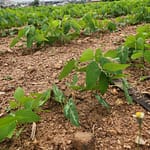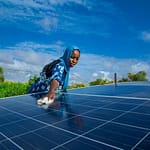Climate change is a global challenge that affects every country, but it disproportionately impacts developing countries like Nigeria. The country has experienced the effects of climate change in the forms of threatened agriculture and food security, water stress, floods, droughts, rising sea levels and stressed ecosystem. From rising sea levels in the south to desertification in the north, these key climate risks have disrupted the economic activities, livelihood, and social systems of the country.
Nigeria needs to achieve a just transition to a low carbon economy as the country faces rapid industrialization and urbanization, with greenhouse gas emission increasing steadily since 2009, ranking third in Africa after DR Congo and South Africa. The country is highly vulnerable to the impacts of climate change as it economy largely depends on its natural resources and millions of its citizens working in agriculture.
Read also: Debt-for-Nature Swaps and Their Potential to Address Nigeria’s Environmental Challenges
In response to these challenges, Nigeria has taken steps to address climate change through policies, regulations, and international agreements and efforts. However, the country’s efforts have been hindered by a lack of adequate climate financing. Climate finance is critical to support Nigeria in its efforts to mitigate and adapt to the effects of climate change.
Assessing Nigeria’s Climate Finance Landscape
Climate finance refers to the financial resources provided by government, developed countries, international organizations, and private sector entities to help developing countries reduce greenhouse gas emissions, mitigate, and adapt to the impacts of climate change.
In Nigeria, climate finance is essential to support the country’s effort to transition to a low-carbon and climate resilient economy. However, the current level of climate finance in Nigeria is inadequate, and there is a need to identify opportunities and progress.
The current level of climate finance in Nigeria is estimated to be USD 1.9 billion. This is only a small fraction of the estimated USD 17.7 billion needed to meet the nationally determined contribution (NDC) target of reducing emissions by 47 percent below business as usual by 2030.
Additionally, Nigeria is the 53rd most vulnerable and the 6th least ready country for adapting to climate change. In line with mitigation financing, which totals USD 11 billion in 2019/2020, adaptation financing must be greatly ramped up to meet the goals for adaptation specified in Nigeria’s NDC. At USD 663 million, adaptation finance is not consistent with the level of the country’s vulnerability to climate change.
Despite the urgency to mitigate the effects of climate change in Nigeria, fossil fuel financing continues to dominate the bulk of development projects. The country was ranked second in Africa with the most fossil fuel financed projects between 2016 to 2021.
It is estimated that climate change will likely cost Nigeria around USD 460 billion annually which is almost 30 percent of the projected GDP by 2050. Nigeria needs an estimate of USD 17.7 billion by 2030 to deliver on the conditional NDC which requires effort and finance from both public and private international and domestic actors. Putting a price on carbon would be a major step towards meeting the NDC.
Despite being the continent’s third largest beneficiary of climate finance, after Egypt and Morocco, the tracked USD 1.9 billion of climate financing moving to and within Nigeria is insignificant in comparison to the size of the country’s economy and prospects for low-carbon growth.
In Nigeria, most of the necessary elements for a well-functioning supply chain for climate finance are already in place. However, there are still significant gaps in terms of firms that can provide the necessary financial and non-financial support for market readiness.
The financial sector in Nigeria is gradually responding to the changes brought about by climate change. On the Lagos Stock Exchange, the nation debuted its first corporate green bonds in 2019. 34 banks have signed the sustainable banking principles, which were created by the Nigerian central bank and are a set of standards that financial institutions are encouraged to report against.
The federal government also partnered with the World Bank group to establish the Nigeria climate innovation center. Its aim is to develop and deploy solutions to climate change by providing venture-development and capacity building support for viable green businesses across the renewable energy, waste management, water, and agricultural sector.
Nigeria’s capital market is relatively small in comparison to its banking industry. It developed sustainability disclosure guidelines that outline a step-by-step strategy to integrating sustainability into enterprises as well as indicators for submitting annual reports to the exchange.
As of 2019, it became mandatory for all listed companies on the NSE’s premium board to provide sustainability report to promote transparency. Notwithstanding, the access to capital and long-term loans still remains a major challenge.
Climate finance in Nigeria is mostly provided by governmental actors at 77 percent, with private sector initiatives behind by 23 percent. The public actors were primarily international development finance organizations at 55 percent, followed by bilateral development finance institutions at 20 percent, and the government at 19 percent, with most of the financing channeled as debt.
Corporations supplied a large portion of private climate finance at 34 percent in the private sector, followed by commercial financial institutions at 12 percent, households/individuals at five percent, and institutional investors at five percent.
The climate finance space in Nigeria has seen steady growth over the years but there are still rooms for active improvements which are not limited to:
- Investing actively in climate-resilient infrastructure via public-private partnerships. The combined efforts of both sectors will cover Nigeria’s rising infrastructure shortfall.
- Concentrating on the deployment of financing for nature-based solutions like flood control systems, drought- resistant crops, and water conservation initiatives. These projects can help Nigeria adapt to the impacts of climate change and reduce the vulnerability of communities and ecosystems.
- Ensuring the smart use of the public climate finance fund to generate private capital for increased investment in underfunded climate resilient projects.
- Funding can be used to support renewable energy projects like solar and wind power, which can reduce Nigeria’s reliance on fossil fuels and lower its greenhouse gas emissions.
Nigeria must take steps to address climate change by assessing its climate finance landscape, increasing the amount and sustainability of climate finance, and prioritizing climate action in national development plans. Achieving these goals require the cooperation of governments, institutions, organizations, and individuals. However, the benefits of addressing climate change in Nigeria are enormous, including improved economic activity and growth, social development, and environmental sustainability.
Subscribe to LIDA Network












